In this article:
Rice water has been in use for hundreds of years in East Asia, such as in Japan, as a natural hair remedy. It is said to strengthen hair, improve its elasticity, and make it healthy. (1)
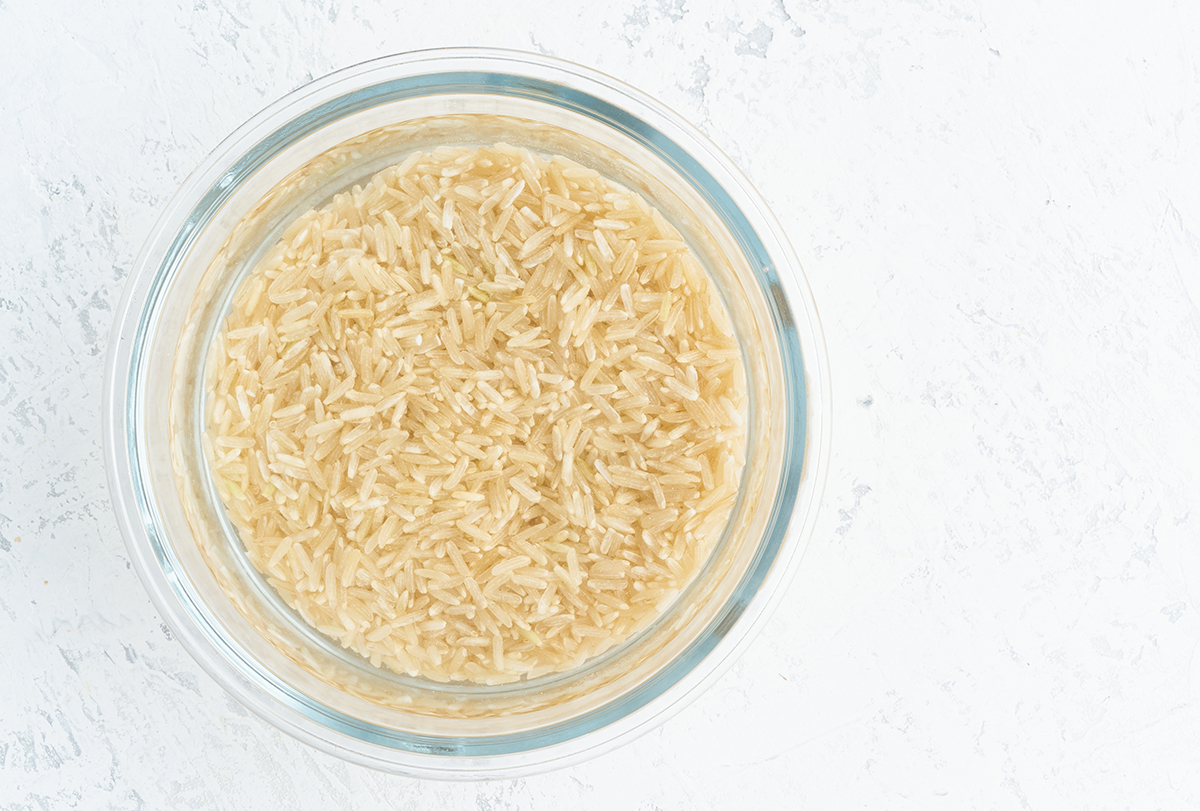
Rice water is obtained by soaking or boiling rice, and the liquid that remains after the rice is strained is known as rice water. The question that arises is when to apply rice water, whether while the hair is still wet or when the hair is dry.
Some experts recommend using it on damp hair, which means the hair should be slightly wet and not completely dry. People also find it better to apply it to damp hair because of the ease of distribution of the rice water throughout the hair.
Those who wish to apply it to dry hair can use rice water to make a mask with other ingredients that can be washed later on.
Ways to Use Rice Water on Wet and Dry Hair
Here are some ways to properly use rice water on hair.
For wet/damp hair
If you are using rice water as a hair rinse, it is better to apply it to wet hair after shampooing and conditioning. This will help to evenly distribute the rice water throughout your hair and allow it to penetrate the strands more effectively.
To make a rice water hair rinse:
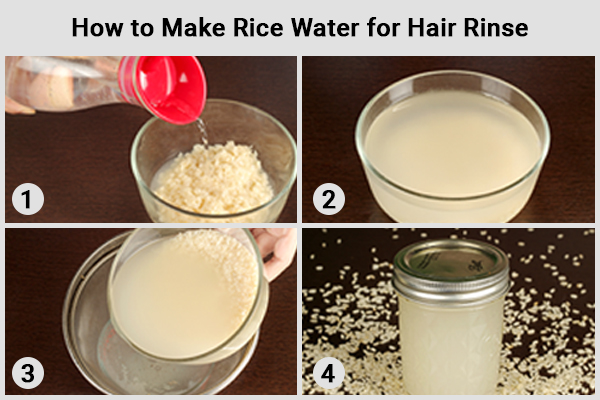
- Rinse 1 cup of rice with water to remove any impurities.
- Soak the rice in 2 cups of water for about 30 minutes.
- Strain the rice mix to get the water. You can use the rice water as it is, or you can leave it to ferment for 24–48 hours to improve its nutritional value.
To use rice water as a rinse:
- Shampoo and condition your hair as you normally would.
- Spray the rice water on your hair, massaging it into your scalp and hair.
- Leave it on for 20–30 minutes.
- Wash your hair with water and style as usual.
For dry hair
You can also apply rice water to dry hair, and using it as a hair mask is an even better option. Some people prefer to apply it to dry hair so that they can leave it on for a longer period.
Making a rice water hair mask is a straightforward procedure that can be accomplished at home with just a few ingredients.
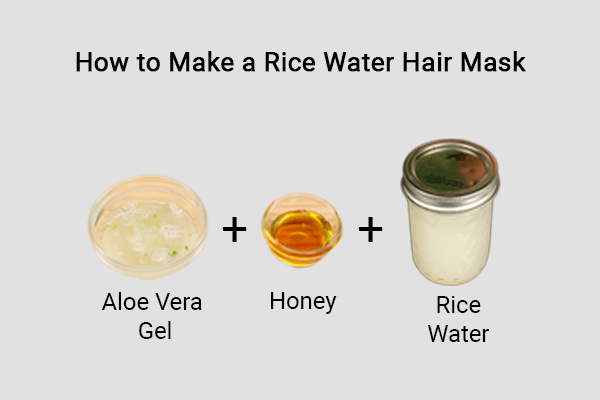
To prepare and apply a rice water hair mask:
- Rinse ½ cup of rice with water to remove any impurities.
- Keep the rinsed rice in a container and add 2–3 cups of water.
- Let the rice soak for at least 30 minutes or up to 24 hours.
- Strain the rice water. You can keep the soaked rice for cooking or discard it.
- Mix 2–3 tbsp of aloe vera gel, 1–2 tsp of honey, and 3–4 tbsp of rice water.
- Apply this mask to your hair, and leave it on for half an hour.
- Shampoo like you always do to wash it off.
Benefits of Rice Water for Hair
Researchers have studied the hair care practices of Japanese women and found that during the Heian Period, court ladies in Japan with floor-length hair, known as suberakashi, combed their hair daily using rice water, which they called yu-su-ru.
Rice was an essential component of the Japanese diet, and the fact that it was utilized for hair care was intriguing. Research findings revealed that yu-su-ru had hair care benefits. (1)
Here are some reasons to apply rice water to hair.
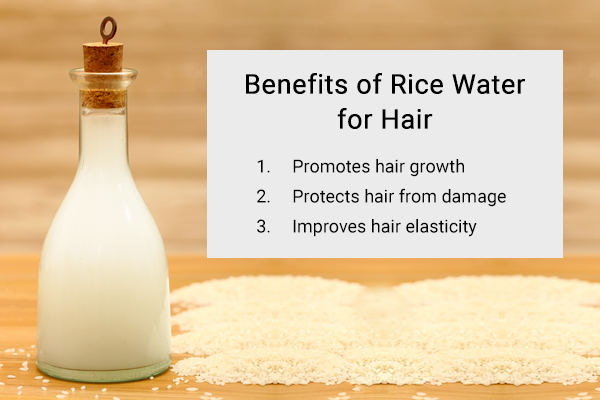
1. Promotes hair growth
According to a review of scientific evidence, rice bran extracts (RB) derived from Oryza sativa (rice) can promote hair growth.
The study found that topically applied RB increases the expression of growth factors and molecular signals that promote cell proliferation in the active growth stage of the hair follicle.
Additionally, RB inhibits the enzymes responsible for transitioning hair from the resting phase of the hair follicle to its active phase. (2)
RB is also safe for human use in cosmetics. The study also found that there are many hair products containing rice derivatives, indicating their popularity in the marketplace.
Overall, the study suggested that rice products have the potential to promote hair growth by maintaining the active growth stage of the hair follicle. (2)
2. Protects hair from damage
Antioxidants such as proanthocyanidins and tocopherols are present in rice water, (3)(4) and researchers claim that antioxidants are good for hair health. (5)
Antioxidants protect the hair from damage caused by environmental factors such as UV rays and pollutants or from damage caused by free radicals in the body.
Research also shows that the application of antioxidants to the scalp enhances the condition of the scalp and decreases hair fall. They also make the hair look fuller and improve the scalp skin barrier. (5)
3. Improves hair elasticity
A study found that yu-su-ru, which is the water obtained from washing rice, exhibited positive hair care effects, including increasing hair elasticity.
The increase in hair elasticity was accompanied by a reduction in surface friction. When the surface friction of the hair is reduced, it becomes easier to comb and style, which can lead to less hair breakage and damage.
Therefore, rice water can help improve the overall health and appearance of hair by reducing friction and making it more manageable. (1)
Are There Adverse Effects of Using Rice Water on Hair?
Since the effects of using rice water on the hair are not yet exhaustively studied scientifically, the practice is yet to be proven as 100% safe or effective.
According to dermatologists, there may be some flaking or dryness of the scalp with the use of rice water in some individuals. If this happens to you, it is best not to keep on using it or depend on it as a sole treatment for your hair problems.
Fermented Rice Water Versus Plain Rice Water as a Hair Rinse
Given below are some reasons why fermented rice water is preferred over plain rice water when used as a hair rinse.
Fermented rice water has high antioxidant activity
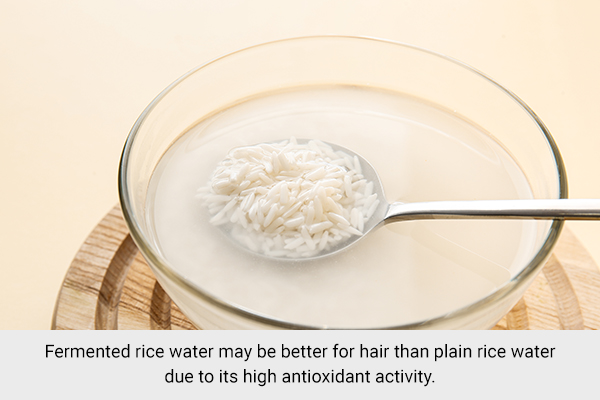
Fermented rice water may be better for hair than plain rice water due to its high antioxidant activity.
Fermentation increases the amount of compounds responsible for antioxidant activity in rice. (6) This is because, after fermentation, there is a breakdown of the plant’s cell walls, which leads to the synthesis of various antioxidant compounds.
These mechanisms increase the overall antioxidant activity of fermented plant-based foods such as rice, making it more effective in promoting healthy hair growth. (7)(6)
Fermented rice is more suitable for maintaining hair pH
Fermentation can reduce the pH of rice water to match the pH of your hair, making it more suitable than plain rice water as plain rice water has a higher pH than your hair pH.
Using products with a suitable pH is important for scalp and hair health; thus, fermented rice water is better for hair than plain rice water. To ferment rice water, you need to soak the rice in water for around 2 days. Then, strain it to obtain a hair rinse solution.
Most-Asked Questions About Using Rice Water for Hair
Can rice water be used on all hair types?
Yes, rice water can be utilized on all hair types, including curly, straight, and wavy hair.
How frequently should I apply rice water to my hair?
It is commonly advised to use rice water on the hair once or twice per week for best results.
Can I keep rice water for future use?
Yes, you can keep rice water in the fridge for up to 7 days for future use. Ensure to store it in a clean container and shake well before using.
Can rice water lead to adverse effects?
Rice water is commonly safe to utilize on hair, but some people may experience flaking. (1)
Final Word
Whether you apply rice water to wet or dry hair depends on your personal preference and the intended use of the rice water.
As a rinse, it is best to apply it to wet hair once you are done shampooing and conditioning, while as a mask or treatment, it can be used on both wet/dry hair. Regardless of how you use rice water, it is important to rinse it out thoroughly to avoid buildup on the scalp or hair.
- Was this article helpful?
- YES, THANKS!NOT REALLY


